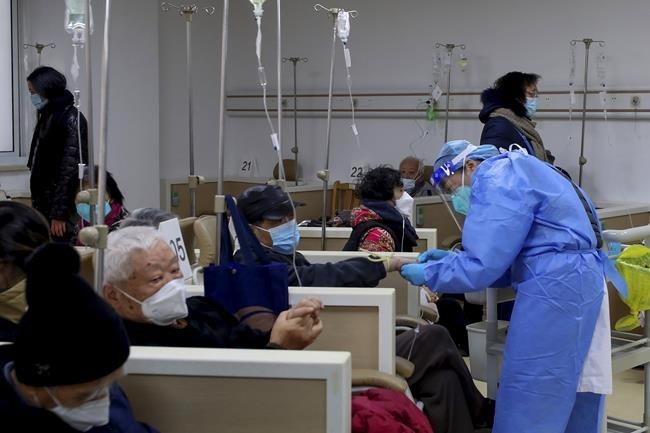BEIJING (AP) — Mostly older men and women wearing masks rested on cots in hallways, while others slept upright in crowded waiting rooms with numbered chairs. Many received fluids intravenously, while others were given oxygen. The sound of people coughing — and of new patients arriving on gurneys — was steady.
At the Chuiyangliu hospital in the east of Beijing on Thursday, signs of the COVID-19 outbreak stretching public health facilities in the world's most populous nation were on full display.
Beds ran out by midmorning at the packed hospital, even as ambulances brought more people in. Hard-pressed nurses and doctors rushed to take information and triage the most urgent cases.
The crush of people seeking hospital care follows China's abandonment of its most severe pandemic restrictions last month after nearly three years of lockdowns, travels bans and school closures that weighed heavily on the economy and prompted unusual street protests in a country that quashes political dissent.
The outbreak appears to have spread the fastest in densely populated cities first. Now, authorities are concerned as it reaches smaller towns and rural areas with weaker health care systems. Several local governments began asking people Thursday not to make the trip home for the upcoming Lunar New Year holiday, signaling lingering worry around opening up.
Overseas, a growing number of governments are requiring virus tests for travelers from China, saying they are needed because the Chinese government is not sharing enough information on the outbreak. The European Union on Wednesday “strongly encouraged” its member states to impose pre-departure COVID-19 testing, though not all have done so.
Italy — the first place in Europe where the pandemic exacted a heavy toll in early 2020 — became the first EU member to require tests for passengers from China last week, and France and Spain followed with their own measures. The U.S. is requiring a negative test result for travelers from China within 48 hours of departure.
China has criticized the requirements and warned of countermeasures against countries imposing them.
World Health Organization head Tedros Adhanom Ghebreyesus said Wednesday he was concerned about the lack of outbreak data from the Chinese government.
At a daily briefing Thursday, Chinese Foreign Ministry spokesperson Mao Ning said Beijing has consistently “shared information and data with the international community in an open and transparent manner."
“At present, China’s COVID-19 situation is under control," Mao said.
On Sunday, many remaining restrictions — some already not being enforced — will be lifted.
“We recommend that everyone not return to their hometowns unless necessary during the peak of the outbreak,” the government of Shaoyang county in Hunan province in central China said in a notice dated Thursday. “Avoid visiting relatives and traveling between regions. Minimize travel.”
Similar appeals were issued by Shouxian county in Anhui province southeast of Beijing and the cities of Qingyang in Gansu province in the northwest and Weifang in Shandong on the east coast.
The appeals, which harkened back to the last few years of strict pandemic restrictions, showed that some officials remain nervous about lifting them too quickly.
The Weifang government notice said residents should celebrate the holiday with video and phone gatherings.
“Avoid visiting relatives and friends to protect yourself and others,” it said.
Despite such concerns, Hong Kong announced it will reopen some of its border crossings with mainland China on Sunday and allow tens of thousands of people to cross every day without being quarantined.
The city’s land and sea border checkpoints with the mainland have been largely closed for almost three years and the reopening is expected to provide a much-needed boost to Hong Kong’s tourism and retail sectors.
___
Associated Press reporters Joe McDonald in Beijing and Kanis Leung in Hong Kong contributed to this report.
Andy Wong And Ken Moritsugu, The Associated Press



